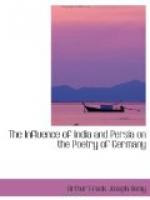Endlich alle Knoepfe rissen
An der Hose der Geduld,
and the poet begins to swear so profanely that the pious Hitzig surrenders unconditionally and hastens to supply the desired information. This image of the “trousers of patience” reminds us strikingly of such Persian phrases as [Arabic] “the cowl of meditation” (Gul. ed. Platts, p. 4), [Arabic] “the carpet of desire” (ib. p. 113), etc., which are a particular ornament of the highly artificial rhymed prose, employed in works like the Gulistan and Baharistan. In the latter, for instance, we read of a youth whose mental equilibrium had been impaired by the charms of a handsome girl: [Arabic] “he tore the garment of prudence and put on the rags of disgrace."[202]
The description of a countess in words like those which Heine puts into the mouth of a Berlin chamber-musician: “Cypressenwuchs, Hyacinthenlocken, der Mund ist Ros’ und Nachtigall zu gleicher Zeit,” ... (Briefe aus Berlin. No. 3, vol. v. p. 205) furnishes another instance in point.
And lastly, we must mention one of the best known of Heine’s poems, the trilogy “Der Dichter Firdusi,” the subject of which is the famous legend of Mahmud’s ingratitude to Persia’s greatest singer and his tardy repentance. We may add that scholars are not inclined to accept this legend as historical in all its parts; certainly not in its artistic and effective ending. This, of course, has nothing to do with the literary merit of the poem, which is deservedly ranked as one of Heine’s happiest efforts.[203]
* * * * *
After all, however, it is clear that Heine is in no sense an orientalizing poet or a follower of the Hafizian tendency which became the vogue under the influence of Goethe, Rueckert and Platen. With him the Oriental element never was more than an incidental feature, strictly subordinated to his own poetic individuality, and never dominating or effacing it, as is the case with most of the professedly “Persian” singers,—those “Perser von dem Main, der Elbe, von der Isar, von der Pleisse”—who thought, as has justly been remarked, that they had penetrated into the Persian spirit by merely mentioning guls and bulbuls. Heine had no use for such trivial superficiality. The singer of the “Loreley” sang as he felt, and in spite of so many apparently un-German sentiments in his writings he had a right to say (Die Heimkehr, vol. i. p. 131):
Ich bin ein deutscher Dichter,
Bekannt im deutschen Land;
Nennt man die besten Namen,
So wird auch der meine genannt.
FOOTNOTES:
[192] Printed as Nachwort in the Bemerker, No. 10, Suppl. to Gesellschafter, No. 77. See also H. Heines Leben u. Werke, Ad. Strodtmann, Hamb. 1883, vol. i. p. 78.
[193] Similarly Bhartrhari, Nitis. 74.




